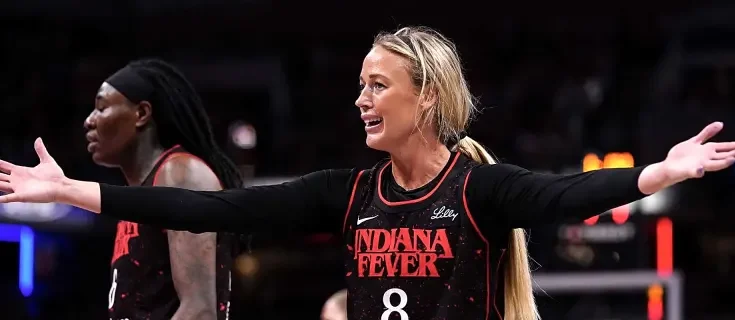Indiana Fever’s Sophie Cunningham Claims WNBA Officials Show Preferential Treatment to Rookie Sensation Paige Bueckers, Sparking Debate Over Officiating Fairness
Indiana Fever guard Sophie Cunningham has stirred controversy by publicly accusing WNBA referees of giving special treatment to rookie phenom Paige Bueckers. The comments, made following a heated matchup between the Fever and Bueckers’ team, have quickly become one of the league’s most talked-about storylines. Cunningham, known for her fiery competitiveness and willingness to speak her mind, didn’t hold back in voicing her frustration over what she perceives as inconsistent officiating.
According to Cunningham, the disparity in calls was noticeable throughout the game. She pointed to multiple instances where she believed Bueckers received whistles for minimal contact, while similar or even more physical plays involving Fever players went uncalled. “It feels like every time she gets touched, it’s a foul,” Cunningham said postgame. “We’re out here competing, but it’s hard when it feels like the rules aren’t the same for everyone.”
Bueckers, the former UConn superstar and one of the most hyped rookies in recent WNBA history, has brought massive attention to the league in her debut season. Her popularity and marketability have been a boon for the WNBA, drawing in new fans and boosting viewership numbers. However, Cunningham’s comments reflect a long-standing concern in professional sports—that star players, especially those with high profiles, sometimes benefit from more favorable officiating.
The game in question was a physical battle from the opening tip, with both teams fighting for playoff positioning. Cunningham was visibly animated on the court, expressing her disagreement with several calls in real time. In one key fourth-quarter sequence, she was whistled for a foul on Bueckers while defending a drive to the basket—a call she argued vehemently, claiming she had established position and made clean contact.
After the game, Cunningham emphasized that her criticism wasn’t personal toward Bueckers. “She’s a great player, and she’s going to be one of the best in this league,” Cunningham said. “But the game has to be called the same for everybody, no matter who’s on the floor.”
The WNBA has not issued an official response to Cunningham’s remarks, and it remains unclear whether the league will review the officiating from the contest. Historically, players have been fined for publicly criticizing officials, though Cunningham’s comments were measured enough to avoid direct accusations of bias against specific referees.
Bueckers, for her part, has not addressed the allegations, instead focusing her postgame remarks on her team’s performance and the importance of securing a hard-fought win. Still, the discourse surrounding Cunningham’s comments has fueled online debates, with some fans agreeing that star players often get more favorable calls, while others argue that Bueckers simply earns her trips to the free-throw line through skill and aggressiveness.
Cunningham’s statement also highlights a broader conversation about how officiating impacts competitive balance. In a league where games are often decided by small margins, the perception of favoritism—whether real or imagined—can erode trust between players and officials. It’s an issue that the WNBA, like all professional leagues, must navigate carefully to maintain the integrity of the game.
As the season progresses, all eyes will be on future matchups between the Fever and Bueckers’ squad to see if tensions resurface. For now, Cunningham’s comments have put the spotlight on an age-old debate in sports—whether certain players get the “star treatment”—and whether the WNBA is doing enough to ensure that every whistle is truly impartial.



